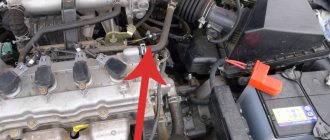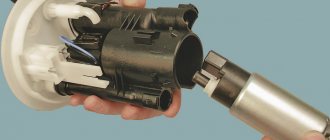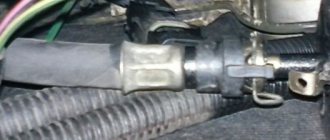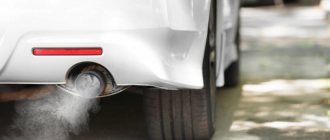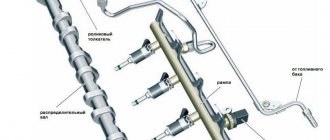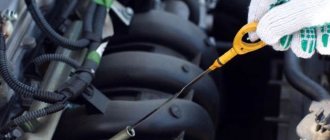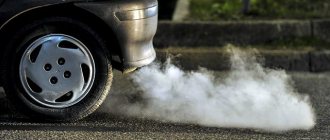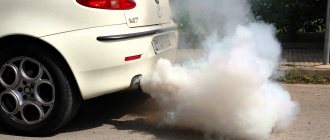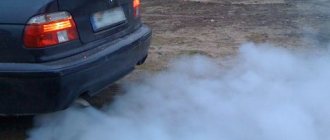This problem worries many motorists, because they are well aware that gasoline is not something to joke about. But another nuisance is added to this problem - fuel consumption increases. If such a problem is discovered, then the first thing to do is inspect the entire car body from the hood to the fuel tank. Sometimes it happens that the nut of the fitting connecting the fuel line to the carburetor becomes loose. The radiator fan blows gasoline vapors back to the muffler. After discovering the cause of the malfunction, the car must be placed in an inspection hole and very carefully trace the path of the fuel from the fuel tank to the carburetor, and if the engine is fuel-injected, then to the injectors. It will be necessary to tighten all the fittings and clamps on the connecting hoses of the fuel line. Often on domestic cars, after just 3-5 years of operation, the gas tank turns into a sieve. If during inspection no gasoline leaks were detected, then you should try to study this problem in as much detail as possible.
Common motor problems
Does the exhaust pipe smell of gasoline and do you feel uncomfortable driving your car? The first step is to unscrew the spark plugs and determine in which specific cylinder the fuel is not burning and is rushing further along the exhaust manifold. A spark plug that is wet or has a greasy appearance than others will show you the main location of the gasoline leak.
If all the candles are evenly greased
Read also: Why does a dog have mucus in his stool?
, then open the oil filler neck and look at the condition of the oil and the presence of light brown foam on the neck cap. This foam indicates that it is time to change the piston rings because in the absence of compression in the engine cylinders, the entire combustible mixture does not burn and fuel particles are carried away into the exhaust pipe.
Cases are not uncommon
, when the chamfer of one exhaust valve in the combustion chamber gradually burns out and through it the gasoline-air mixture constantly breaks through into the exhaust pipe. An experienced mechanic will help eliminate gasoline leakage in it.
It is necessary to replace the piston rings, valves, and in advanced cases, the aluminum pistons themselves. That is, you are guaranteed an average engine repair. And yet, you should not rush into repairs; first, diagnose the engine.
Not everything is so bad
. A loose cap on the spark plug or a high-voltage spark plug wire with a breakdown will cause the spark plug to work intermittently, which will allow gasoline to flow freely into the exhaust manifold.
But don’t be alarmed if you see some kind of liquid pouring out of the muffler in a stream or drop by drop; this is not gasoline, but steam condensation that forms on the cold walls of the muffler when the engine starts. Although condensation can also smell like gasoline.
Read also: Why you can’t drain swamps
Where does the smell of gasoline come from in the car?... Leak in the tank
| The smell of unburnt gasoline from the exhaust. The smell of gasoline when starting the engine: the main reasons. What to do if the muffler smells of gasoline We spend more and more of our time in cars, and manufacturers are making their interiors more convenient and practical every year; but no matter how comfortable it is inside the car, the smell of gasoline or other unpleasant odors causes great discomfort. Once the reason has been found that caused the unpleasant gasoline aroma to spread throughout the interior of the car, it is imperative to clean this very interior. |
| Gasoline in oil: reasons for fuel getting into the engine This situation leads to a delay in engine heating, and in the most unfavorable cases, to the inability to reach the nominal optimal temperature. This can happen even due to one inoperative engine cylinder, but if this is a permanent defect, then it will be accompanied by other manifestations, such as loss of power or deterioration in driving dynamics. |
- pass a few tablespoons of coffee beans through a coffee grinder;
- pour the resulting powder onto the seat with the stain;
- leave for 6 hours;
- Clean off the product with a brush; collect the remaining residue with a vacuum cleaner.
Injection problems
If you have a modern fuel-injected car, but the smell from the muffler appears like that of an old Volga
, therefore the fuel is re-enriched. One of the reasons for this is a malfunction of the lambda probe. Also on injection machines there is a valve that regulates the discharge of unused gasoline back into the gas tank. If it fails, the combustible mixture will be greatly over-enriched.
A faulty air mixture sensor creates the same problem. An experienced auto electrician will quickly fix these problems.
Do you have a modern car, but have you noticed that the exhaust pipe smells of gasoline? There is no need to panic, there is an explanation for this. A catalyst is installed in the exhaust pipe, which is required to clean and burn harmful substances and gasoline vapors found in the exhaust gases. But until the catalyst heats up to a temperature of 250°C, it does not clean anything.
Its operating temperature is 600-800°C
Oils and other liquids that do not meet the requirements of the car manufacturer
Another reason is if one or more engine cylinders have failed. But this will immediately become noticeable, since the power drops significantly, driving dynamics deteriorate and, at the same time.
Conclusion
Remember that gasoline vapors are very harmful to the human body. Therefore, if you detect the slightest smell of gasoline in the cabin, and even more so if it appears on a regular basis, immediately carry out a set of measures to find and eliminate the causes of this phenomenon. Also, do not forget that gasoline vapors are flammable and explosive. Therefore, when performing the relevant work, be sure to follow fire safety regulations. It’s better to work outside or in a well-ventilated area so that gasoline vapors do not enter your body.
It becomes completely uncomfortable in the car if the smell of gasoline suddenly appears in the cabin. As a rule, it serves as a harbinger of trouble. Most likely there was a fuel leak somewhere. This can happen in many places, but it is still necessary to find and eliminate the source of the odor.
If you have water coming out of the exhaust
In most cases, if there is water coming out of your exhaust pipe, it should be accompanied by white smoke. This is a good thing as it can help you more easily identify your problem and fix it accordingly. Fortunately, in most cases, when water comes out of the exhaust pipes, it is not a problem, since only condensed water will form in the exhaust system (this usually happens on colder days).
You can confirm this if white smoke comes out of the exhaust pipe, it should be very thin and vapor-like. This problem can be easily resolved if you let the machine run for a few minutes (the smoke should become colorless) and if this happens, you have nothing to worry about.
On the other hand, if the car has been running for several minutes and the white smoke coming out of the exhaust pipe is very thick, it could become a more serious problem for your engine.
Consequences. Leak in gas tank
In any case, if such signs are detected, you should go straight to the service station, where a complete diagnosis of all systems of your car will be performed. In any case, the problem needs to be solved as soon as possible, since operating the engine with a gasoline-oil mixture in the lubrication system is highly not recommended.
| Cause | Description |
| Supply of rich mixture during cold start | If the smell goes away after some time, then most likely there is nothing wrong - the ECU simply supplies an enriched mixture for an easier cold start. |
| Injector malfunction | Accompanied by interruptions in fuel supply, engine tripping, and unstable starting. |
| Leaking fuel line | Increased fuel consumption, the presence of gasoline leaks, wet spots under the car - all this indicates a leak. The smell of gasoline lingers almost constantly. |
| Sensor malfunction | If the sensors give incorrect readings, the computer constantly supplies an enriched mixture. At the same time, the car loses power, the spark plugs quickly become covered with soot, and black or gray smoke is observed from the exhaust pipe. |
There is a smell of gasoline in the car: reasons
So, let us immediately note that the smell of gasoline in a car may not appear all the time, but only under certain conditions. For example, in severe frosts or heat, when a cold engine is just starting or after the power unit has warmed up, when filling a full gas tank, etc.
In any case, it is necessary to establish the reason why the odor occurs. Note that in some cases it is quite difficult to quickly solve the problem. It is necessary to check the elements of the fuel system step by step.
- First of all, you need to start diagnosing with the gas tank and its cap. The tank, especially on older cars, can rot. The tank mounts also suffer, as a result of which it begins to shift. Also, over time, welds, etc., become unusable.
The possibility of mechanical damage should also not be excluded. One way or another, even a minor leak will mean that fuel leaks out, filling the car interior with fumes, etc.
This valve is needed to avoid an increase in pressure in the tank during temperature fluctuations and expansion of gasoline with heating. If the valve is clogged or stuck, or there are problems with the sealing gasket of the cap, then a distinct smell of gasoline will appear.
- Let's move on. If everything is normal with the tank, then you need to inspect the fuel line, connections and clamps, and also check the integrity of the pipes. Along this line, gasoline is both supplied to the internal combustion engine (supply) and its excess is returned back to the tank (return).
Hoses may begin to leak, and the reliability of their fastenings will deteriorate. It is quite obvious that in this case a leak also occurs, and gasoline fumes will annoy the driver with the smell of fuel in the cabin.
The next element to check is the fuel pump. On cars with a carburetor, the fuel pump is often located under the hood or outside the tank. At the same time, on injection cars, the fuel pump is submersible (located in gasoline to extract fuel and cool), that is, it is actually “screwed” into the gas tank. As a rule, on many cars with an injector, the pump is located under the rear seat right inside the vehicle.
Fuel filters, especially if they are dirty and have reduced capacity, can also cause the smell of gasoline in the car. The reason is an increase in pressure in the fuel line, after which the joints of the pipes begin to leak; gasoline can flow at the “input” before or at the “outlet” after the filter itself.
To eliminate this cause, the fuel filter needs to be changed, and as part of further operation, select the correct element for a specific car and replace the filter according to the regulations, avoiding severe contamination of the filter element.
- The power supply system with a carburetor requires a separate check of this fuel supply system to the engine. Often, the carburetor requires adjustment, and its incorrect adjustment or malfunction of the device leads to gasoline overflowing.
Naturally, active evaporation of fuel in the engine compartment will cause gasoline vapors to enter the cabin. To prevent this from happening, it is necessary to properly adjust the fuel level in the float chamber, check the condition of the jets, regularly clean the carburetor, etc.
Burning smell when starting the engine
If you smell a burning smell when starting the engine in cold weather, then first of all you need to determine the nature of the smell:
- sharp and caustic,
- sweetish,
- bitter, etc.
The sharp and acrid smell of burnt rubber indicates that pipes or seals are heating up somewhere in the engine compartment. A sweetish aroma indicates a leak of antifreeze onto a hot surface. The bitter smell is the smell of burnt motor oil. First of all, check the engine for leaks of technical fluids, and also make sure that no parts rub against hot elements - the exhaust system, exhaust manifold, etc.
Check all pipes for leaks, pay special attention to the tightness of the clamps
Note:
If you have technical problems with the Ford car brand, information is here !
Diagnostic measures
How can a driver understand the causes of problems with the car’s exhaust system on his own?
- It is necessary to check the tightness of the pipes and the rocker boot. It is not recommended to touch the pipes with your hands - during operation of the power unit they have a high temperature. You can check for leaks by running your hand through the air.
- Sometimes it doesn't hurt to look in the trunk. Seals in station wagons and hatchbacks suffer from wear more often than in other car brands. Checking ventilation with check valves will give a positive result.
- In older cars, it is recommended to remove the plastic luggage “pocket”. Vehicles rust, and holes created during operation are another reason for the smell of exhaust gases to appear in the cabin and eliminate this problem.
You can patch the seals on the rear windows using Liquid Nails glue. Sometimes the car starts to smell like rotten eggs. What is this?
THE SMELL OF GASOLINE FROM THE EXHAUST PIPE
In this case, the situation is not so clear-cut. Of course, the smell of gasoline spreading from the exhaust pipe can also be caused by an over-rich mixture, as when starting a cold engine, but this problem should be considered a little more broadly. The smell indicates incomplete combustion of fuel, but the reasons may be different.
These include wires, spark plugs, ignition coils, mass flow sensor, lambda probe, catalyst and much more. Such a variety of reasons makes it difficult to independently determine why the smell of fuel is coming from the exhaust pipe. Therefore, it would be best to stop by for diagnostics.
Main reasons for increased fuel consumption
When the economic situation gets worse, there is a need to reduce costs at least a little. This applies to all areas of life: car operation does not remain aside. Fuel consumption deserves special attention, because the less often you have to visit a gas station, the more money you can save in your wallet.
There are many reasons for increased consumption. Some indicate a change in operating conditions, others indicate an impending breakdown of the car. Therefore, at the first signs of exceeding the norm, it is necessary to look for the cause and take measures to eliminate the problem.
Why does my exhaust smell like gasoline and my car is idling?
An internal combustion engine requires a precise mixture of fuel and air to operate properly. Too many of them can lead to serious problems during operation. When your engine is idling and the exhaust smells like raw, unburned gasoline, it is suffering from rich condition or incomplete combustion. There are four main component failures that can lead to this condition.
Dirty or worn spark plugs
Over time or due to mechanical problems, the spark plugs in your vehicle become worn out or dirty. The actual act of wearing a spark plug is when the electrode wears, widening the gap of the spark plug. The widening of the gap causes a cooler spark, which can lead to incomplete combustion because it cannot burn all the fuel in the combustion chamber. This allows raw, unburned fuel to escape from the exhaust. Dirty plugs have foreign matter - ash, soot, tar, oil or fuel - that coats the electrodes, causing excessive resistance and causing colder sparking. This results in a rough idle and fuel smell in the exhaust.
Faulty ignition coil(s) or distributor
The ignition coil(s) and distributor supply electrical current to the spark plugs so that a spark can occur. If the coil(s) or distributor fails, the spark may be too cold to ignite all the fuel in the combustion chamber. The symptom is a rough idle and the smell of gasoline from the exhaust.
Leaking fuel injector or carburetor
Your vehicle's fuel injectors or carburetor regulate the flow of fuel into the combustion chamber. If the injector or carburetor begins to leak fuel into the combustion chamber, it creates a rich operating condition. This results in a rough idle and unburned gas entering the exhaust and creating a gasoline smell in the exhaust.
Faulty computer
From the mid-1980s to today, computers have become more common in cars. The car's computer controls everything from the power windows to the fuel and air mixture. If the car's computer fails, it may not read the air-fuel mixture correctly. This can cause the computer to think the engine is running lean—not enough gasoline—and increase the flow of fuel into the combustion chamber. This will result in a rough idle and a gas smell in the exhaust.
The car interior smells like gasoline: what to do, how to get rid of the smell?
If you are sure that everything is in order with the car, and no leaks or damage were found at the service station, you need to deal with the smell of gasoline in the car’s interior. There are special means or traditional methods for this.
Review of folk recipes:
- The simplest remedy is to wash the seats and upholstery of the car, as well as the rugs, using a special product, car shampoo. If this does not help, you need to pour regular baking soda onto the seats and mats, slightly moisten the seats and leave for 24 hours. After this, everything is cleaned with a damp sponge. Next, cleaning is carried out with a vacuum cleaner.
- You can also deal with the smell of gasoline inside your car using vinegar. To do this, you need to prepare a solution, mix vinegar and water in a one-to-one ratio, put the liquid in a spray bottle and spray it on the car upholstery, as well as the carpets. After this, you need to let everything dry for 24 hours in the air. Therefore, it is best to remove the seats and floor mats from the car. After this, carry out the usual wet cleaning.
- You can cope with the smell using ground coffee. To do this, grind a handful of coffee beans in a coffee grinder, sprinkle on problem areas or the area where you spilled gasoline, which often happens in the trunk of a car when transporting a canister of fuel. After this, cover with an old rag and seal with tape. After a few hours the smell will no longer bother you. But don't rush to remove the coffee from the place. Leave it for several days. The fact is that coffee contains special oils that absorb odors. After some time, the smell of gasoline will be completely absorbed, all you have to do is remove the remaining coffee and vacuum the contaminated areas with a regular vacuum cleaner.
Restoring tightness Do not rush to immediately use folk remedies and household chemicals. First of all, it is worth understanding the causes of the smell inside the cabin, and only after the causes of the leak have been determined and there are no causes, you can begin to eliminate the smell. Most often, the smell of gasoline in a car indicates a serious breakdown that needs to be repaired as soon as possible .
The exhaust pipe of the muffler smells of gasoline, why?
The smell of gasoline from the exhaust pipe of the muffler indicates problems in the operation of the car engine associated with a strong over-enrichment of the fuel mixture. Using the example of a carburetor engine of a VAZ 2108, 2109, 21099, we will understand the reasons for the smell of gasoline, and also see what instructions are there for how to independently eliminate this malfunction.
Symptoms of a problem
In most cases, the driver notices the problem when the smell of gasoline from the exhaust pipe of the car engine begins to be felt if he is near the car when the engine is idling.
If problems arise, it will smell not only when the cold engine warms up, but also when running hot. Also, fuel vapors can be drawn into the cabin when driving. The smell can vary in strength - from barely perceptible, to the stage when it becomes dangerous to smoke near the car.
Often the smell of gasoline from the muffler is accompanied by unstable engine idling, blackening of the electrodes of the spark plugs and exhaust pipe, decreased power and throttle response, poor starting when hot, increased fuel consumption, and noticeable dark smoke of varying degrees. At the initial stage of the problem, there is simply a smell from the muffler, but if you put your palm to the exhaust pipe and then smell it, the smell of gasoline will be clearly noticeable.
— The carburetor and (or) engine fuel system are faulty
There are malfunctions in the carburetor and fuel system of the engine that create an over-richness of the fuel mixture and the accompanying smell of gasoline from the muffler. Here are the most “popular” of them.
In the Solex carburetor of VAZ 2108, 2109, 21099 cars, you should pay attention to the following - fuel can enter the car engine not only through the fuel nozzle in the solenoid valve (EMV) and the CXX outlet, but also, for example, through the holes in the transition systems if the throttle valves are set incorrectly (slightly open at idle more than normal) or are pulled out of the GDS nozzles at an increased fuel level. More details about the problem: “The carburetor is overflowing” and “Why is the Solex carburetor pouring into the second chamber.”
The Solex carburetor can “pour” into the second chamber from the GDS nozzle, the nose of the UN nozzle and from under the gasket under its “cover”
In addition, the enrichment is affected by the correspondence of the rating of the CXX fuel jet to a given carburetor.
Something else happens.
The GDS air jets are clogged, or they are of a smaller diameter than required for this carburetor model. Either simply dirt, or oil, if the crankcase or piston ventilation system is faulty.
Air jets GDS carburetor Solex
Severe contamination of the engine air filter element. The amount of air passing through the carburetor decreases, the air/gasoline ratio in the fuel mixture is disrupted in favor of gasoline.
GDS fuel jets of increased diameter were installed (consequences of tuning).
The fuel level in the carburetor float chamber is too high. Very often the culprit is a leaking fuel shut-off valve.
Checking the Solex carburetor needle shut-off valve
The air damper in the carburetor is closed at idle and when driving. Ideally, when the engine is warm, it should stand strictly vertically. Probably its drive is not adjusted or the idle system is not working and you have to enrich the fuel mixture by covering the air damper in order for the engine to somehow work.
A 10 mm gap between the edge of the choke control lever and the edge of the rod shell when the choke is fully open is an indicator of a correctly adjusted drive
The economizer of power modes is faulty (the economizer valve can be constantly open due to a broken diaphragm and the fuel will become rich in all modes). See “Checking and repairing the economizer of power modes of the Solex carburetor 2108, 21081, 21083.”
Economizer device for power modes of carburetor 2108, 21081, 21083 Solex
Pumps the fuel pump. It should create pressure on the needle valve of the float chamber within 0.2-0.3 atmospheres, but if its drive is not adjusted, this value can increase significantly. The valve will not hold the pressure of gasoline, the fuel level will increase, overflow and re-enrichment of the fuel mixture will occur.
— The ignition system of the carburetor engine is faulty
A weak or intermittent spark at the spark plug electrodes will not allow the fuel mixture to burn completely. It is thrown into the engine exhaust system, where it will burn out and smoke.
What leads to such consequences?
The initial ignition timing is too early. The fuel mixture is ignited too early, does not burn completely because the conditions for normal pressure are not met (for example, there is no required pressure in the combustion chamber) and is thrown into the exhaust pipe. In addition, the fuel mixture ignited too early creates resistance to the movement of the piston to TDC, which significantly reduces engine power. An advance created by the vacuum and centrifugal ignition timing regulators in the distributor is superimposed on the too early initial ignition timing angle, which completely and irrevocably spoils the picture of what is happening.
One or more spark plugs are faulty. Misfires on spark plugs also lead to the ejection of unburnt fuel mixture into the muffler and the appearance of the smell of gasoline from it.
The armored wires, the slider, and the distributor cover are faulty. “Punctured” parts of the ignition system allow high voltage current to “leak” to ground, which reduces the strength of the spark or causes its complete disappearance.
The ignition coil is faulty. Most often, current leaks to ground from its central terminal (for example, through a crack).
Notes and additions
— The cause of the smell may be wear on the engine piston group (it has worn out), incorrectly adjusted thermal clearances of the valves, and a violation of the relative position of the crankshaft and camshaft (the timing marks are displaced), for example, after replacing the timing belt or other repairs. In all these cases, the smell of gasoline from the muffler is inevitable, since the combustion processes of fuel will be disrupted and it will be thrown into the muffler.
Catalyst malfunctions © Leak in the gas tank
| It smells like gasoline when starting the engine: what should the driver do - Auto Service The use of low-quality fuel and lubricants provokes the occurrence of defects in the piston block of a carburetor engine or an injector-based working unit. Connect the compression gauge to one of the cylinders and rotate the engine with the starter until the needle stops moving in the direction of increasing readings. |
| Reasons for increased fuel consumption - technical, operational, questions and answers For example, problems with the ignition system, compression in the cylinder, mixture formation and a number of other problems will lead to the fact that the charge will burn incompletely even after the power plant has warmed up. Sometimes the damage after a gasoline flash in the crankcase was more serious: a gasket under the pan or cylinder head broke, the oil plug broke, and a fire broke out. |
- increased gasoline consumption;
- reduction in engine power indicators;
- transformation of oil shade and smell;
- the occurrence of an unusual sound in the piston space;
- cooler volume.
The exhaust pipe smells like gasoline: reasons • This is very dangerous because it can cause a fire and even an explosion of the car.
Possible engine problems
Does the muffler smell like gasoline and is it not very comfortable to drive? Then, the first thing to do is to unscrew the spark plugs and try to understand in which of the cylinders the fuel does not burn and passes further through the exhaust manifold. The location of the gasoline leak will be indicated by a wet or greasy spark plug.
It is not uncommon for the chamfer of one of the exhaust valves in the combustion chamber to burn out. It is from there that the fuel-air mixture exits into the exhaust pipe. An experienced auto mechanic can help eliminate the penetration of the gasoline mixture.
It will be necessary to change the rings on the pistons, valves, and sometimes the pistons themselves. So, we can assume that the car owner is provided with an average repair of the power unit. However, there is no need to rush into repairs; first, it is better to diagnose the engine, because not everything is always so hopeless.
A poorly fitting spark plug cap or high voltage wire can cause the spark plug to operate intermittently. This may allow fuel to flow freely into the exhaust manifold. There is no need to be alarmed if some kind of liquid suddenly pours out of the muffler, because it is not fuel, but condensation formed on the walls of the muffler when starting the engine. Of course, it may smell like gasoline, but don’t worry, it’s not gasoline.
Gasoline in oil - symptoms, causes and effects. What to do?
The smell of gasoline in the oil is a very common, but also an ominous sign of car trouble. What should you be prepared for when you notice an error like this? What to do then? Is there a chance that you can fix the damage yourself? We will tell you about this in the text below.
At the outset, we would like to point out that there will always be small amounts of gasoline in the oil.
This is due to the small amount that will remain on the cylinders. We also have good news for owners of diesel engines - these problems almost never affect them
Gasoline in oil - symptoms
First let's focus on identifying the problem. You will recognize this mainly because the oil smells like gasoline.
. The smell of fuel is specific, and the combination of oil and gasoline will be recognized even by an inexperienced driver.
Remember that a symptom of gasoline getting into the oil is not only the specific smell of fuel. If you see more and more oil appearing on the dipstick, you can be sure that something is thinning the oil.
Gasoline from the exhaust pipe
| Registered: Fri Oct 03, 2008 1:49 pmMessages: 29 | Motorcycle CB400 SF VTEC3 2004 |
| Registered: Fri Oct 03, 2008 1:49 pmMessages: 29 | |
| Registered: Sat Jan 26, 2008 9:56 pmMessages: 684 | |
| Registered: Fri Oct 03, 2008 1:49 pmMessages: 29 | That's how things are. I don’t know if I’ll start in the morning. |
The smell of burnt wires
This may indicate problems with the vehicle's wiring. Despite the presence of many fuses, even they do not guarantee the prevention of short circuits. If the smell definitely comes from the car, it is recommended to inspect the car's wiring or contact a car service center.
If smoke appears, you must immediately perform the following actions:
- Stop the car.
- Turn off the ignition.
- Disconnect the terminals from the battery.
- Call a towing service and then head to a service center.
This problem should be solved as quickly as possible, since a car fire poses a danger to both you and other road users.
What is the danger of water in the muffler?
Natural transparent condensation is not a problem if there is little of it. It’s just water - its accumulation, on the contrary, indicates the serviceability of all systems. Things get worse if the moisture has an unusual color and thick black smoke appears.
Danger No. 1 - condensation can turn into ice. This threatens to rupture the muffler or resonator. In addition, when water freezes, important channels connecting the motor to other systems become clogged. Therefore, it is very difficult, almost impossible to start the car.
Danger #2 is corrosion. The internal cavities of the exhaust system quickly rust. For example, on the first VAZ cars, the resonators and pants rotted in almost 3 years, although they were made of durable steel. With a stainless muffler of foreign cars, things are somewhat better, but condensate can react with sulfur dioxide (present in the exhaust of any internal combustion engine), form acid and corrode the metal in 1-2 years.
Moisture is especially dangerous for a diesel unit. Here, fuel lines and fine filters easily freeze, and interruptions in the operation of glow plugs occur even in summer.
The color of the condensate coming out of the muffler is important. Yellow (or red) color indicates an antifreeze or oil leak. Black condensate is the use of low-quality fuel with additives. Also, black color indicates carbon deposits. The green tint is a consequence of the high sulfur content in gasoline.
How to prevent liquid from appearing in the exhaust system of a car?
The likelihood of condensation forming does not depend on what kind of machine you have. You may be the owner of an old penny or a luxury car, but you are unlikely to be able to resist the laws of nature. However, there are ways to minimize the harmful effects if you follow a few simple rules.
- Don't be lazy about putting your car in the garage. Often in cold weather, drivers do not want to walk the extra distance from the garage to the house and leave the car right on the street. Don't do this if you feel sorry for your iron horse. If the car spends the night in a warmer room, it will have to warm up much less the next morning.
- Some cars have an automatic warm-up function. It turns on independently at a certain period of time. However, even with such a system, the next day there may be ice in the pipe. This means that the warm-up time is simply not enough for the muffler itself to warm up. The metal still remains cold and promotes condensation. There is a way out of this situation: simply increase the operating time of the heating system.
- If it is not possible to park the car in a garage or use the automatic heating function, insulate the muffler itself. A non-flammable heat insulator or liquid heating will help you with this.
- Change your gas station: Your fuel may not be as high quality as you think. Often this method helps, if not completely get rid of it, then at least reduce the amount of moisture formed.
Problems of a modern engine
If you drive a modern fuel-injected car, and the Glushak “rushes” like an old Volzhana, we can conclude that the fuel is being over-enriched. The cause may be improper operation of the lambda probe. On fuel-injected cars there is a valve that regulates the discharge of unburned fuel back into the gas tank. If it breaks down, the gasoline will be very rich. A failed air mixture sensor can create a similar problem. An auto electrician will be able to “deal” with such a malfunction very quickly.
Technical reasons
Most often, the most intense penetration of fuel into the oil occurs on a cold engine, since after warming up the fuel evaporates better and flows less intensively into the crankcase. That is, to get rid of the remaining odor that is probably present there, since gasoline vapors are very volatile and easily eat into a variety of materials, especially fabric materials, making themselves felt for a long time.
